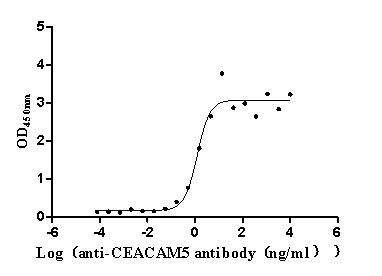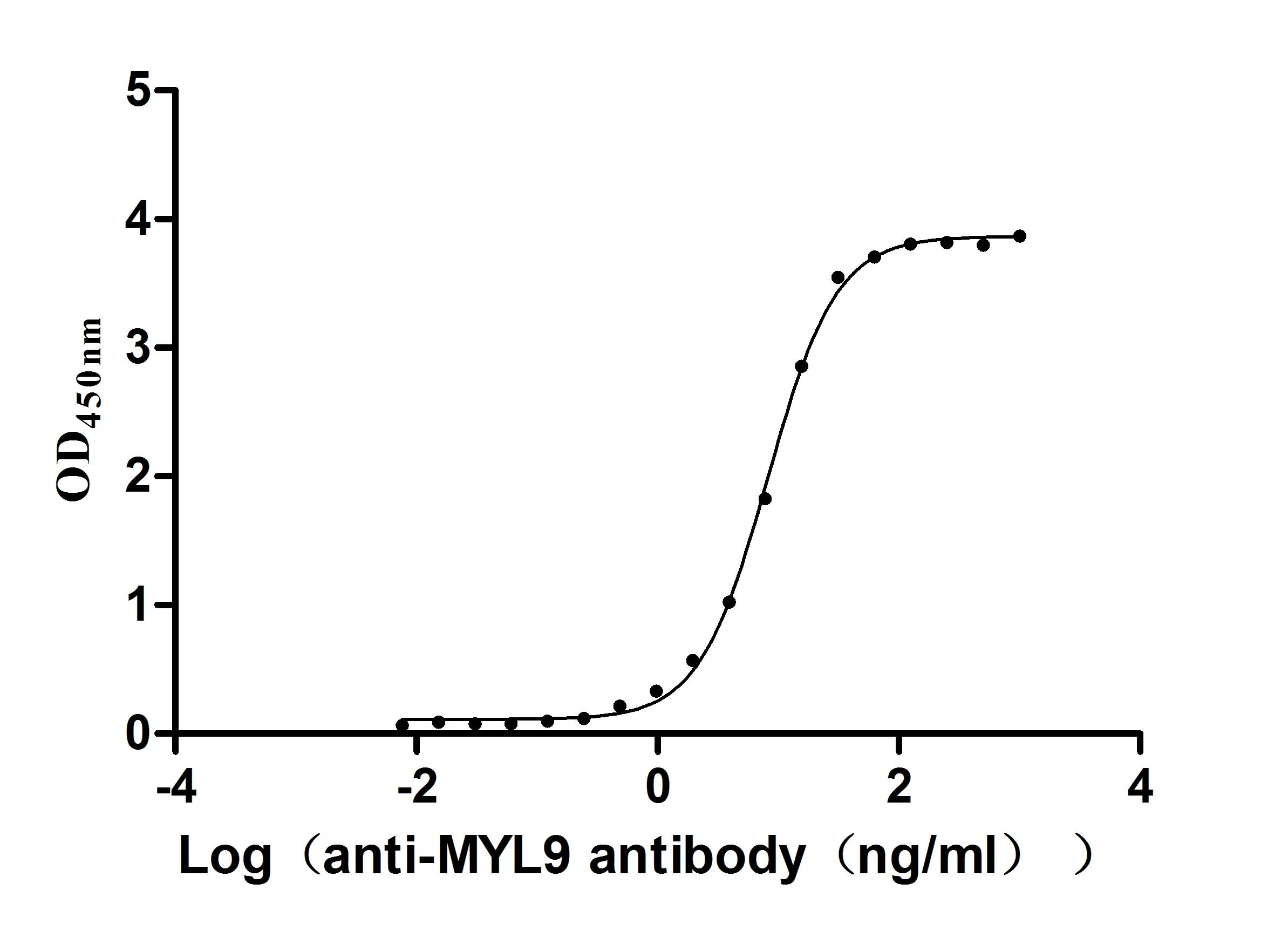Recombinant Human Growth-regulated alpha protein (CXCL1)
-
货号:CSB-YP006239HU
-
规格:
-
来源:Yeast
-
其他:
-
货号:CSB-EP006239HU-B
-
规格:
-
来源:E.coli
-
共轭:Avi-tag Biotinylated
E. coli biotin ligase (BirA) is highly specific in covalently attaching biotin to the 15 amino acid AviTag peptide. This recombinant protein was biotinylated in vivo by AviTag-BirA technology, which method is BriA catalyzes amide linkage between the biotin and the specific lysine of the AviTag.
-
其他:
-
货号:CSB-BP006239HU
-
规格:
-
来源:Baculovirus
-
其他:
-
货号:CSB-MP006239HU
-
规格:
-
来源:Mammalian cell
-
其他:
产品详情
-
纯度:>85% (SDS-PAGE)
-
基因名:
-
Uniprot No.:
-
别名:C-X-C motif chemokine 1; Chemokine (C-X-C motif) ligand 1 (melanoma growth stimulating activity; alpha); chemokine (C-X-C motif) ligand 1; CINC-1; CXCL1; Cytokine-induced neutrophil chemoattractant 1; Fibroblast secretory protein ; Fsp; Gro 1; Gro A; Gro; GRO protein; alpha; GRO-alpha(1-73); GRO-alpha(6-73); Gro1; GRO1 oncogene (melanoma growth stimulating activity; alpha); GRO1 oncogene (melanoma growth-stimulating activity) ; Gro1 oncogene; GROa; GROA_HUMAN; Growth-regulated alpha protein; KC; KC chemokine; mouse; homolog of; melanoma growth stimulatory activity alpha ; Melanoma growth stimulatory activity; Melanoma growth stimulatory activity; alpha; MGSA alpha ; MGSA; MGSA-a; N51; NAP-3; NAP3; Neutrophil-activating protein 3; Platelet-derived growth factor-inducible protein KC; Scyb 1; Scyb1; Secretory protein N51; Small inducible cytokine subfamily B; member 1
-
种属:Homo sapiens (Human)
-
蛋白长度:Full Length of Mature Protein
-
表达区域:35-107
-
氨基酸序列ASVATE LRCQCLQTLQ GIHPKNIQSV NVKSPGPHCA QTEVIATLKN GRKACLNPAS PIVKKIIEKM LNSDKSN
-
蛋白标签:Tag type will be determined during the manufacturing process.
The tag type will be determined during production process. If you have specified tag type, please tell us and we will develop the specified tag preferentially. -
产品提供形式:Lyophilized powder
Note: We will preferentially ship the format that we have in stock, however, if you have any special requirement for the format, please remark your requirement when placing the order, we will prepare according to your demand. -
复溶:We recommend that this vial be briefly centrifuged prior to opening to bring the contents to the bottom. Please reconstitute protein in deionized sterile water to a concentration of 0.1-1.0 mg/mL.We recommend to add 5-50% of glycerol (final concentration) and aliquot for long-term storage at -20℃/-80℃. Our default final concentration of glycerol is 50%. Customers could use it as reference.
-
储存条件:Store at -20°C/-80°C upon receipt, aliquoting is necessary for mutiple use. Avoid repeated freeze-thaw cycles.
-
保质期:The shelf life is related to many factors, storage state, buffer ingredients, storage temperature and the stability of the protein itself.
Generally, the shelf life of liquid form is 6 months at -20°C/-80°C. The shelf life of lyophilized form is 12 months at -20°C/-80°C. -
货期:Delivery time may differ from different purchasing way or location, please kindly consult your local distributors for specific delivery time.Note: All of our proteins are default shipped with normal blue ice packs, if you request to ship with dry ice, please communicate with us in advance and extra fees will be charged.
-
注意事项:Repeated freezing and thawing is not recommended. Store working aliquots at 4°C for up to one week.
-
Datasheet :Please contact us to get it.
相关产品
靶点详情
-
功能:Has chemotactic activity for neutrophils. May play a role in inflammation and exerts its effects on endothelial cells in an autocrine fashion. In vitro, the processed forms GRO-alpha(4-73), GRO-alpha(5-73) and GRO-alpha(6-73) show a 30-fold higher chemotactic activity.
-
基因功能参考文献:
- The chemokine Gro1 induced in response to inflammation triggers senescence and arrests development of new neurons in the hippocampus and that the magnitude of this response is sex-dependent. PMID: 30201019
- CXCL1 displays a specific microRNA (miR) upregulated by the prototypical colon cancer onco-miR miR-105. PMID: 30115896
- These results show that AKIP1 is crucial in cervical cancer angiogenesis and growth by elevating the levels of the NF-kappaB-dependent chemokines CXCL1, CXCL2, and CXCL8. PMID: 29520695
- Adipose stromal cells recruitment to tumours, driven by CXCL1 and CXCL8, promotes prostate cancer progression. PMID: 27241286
- CXCL1, which is produced by breast cancer cells, can promote cancer growth and development PMID: 29438938
- miR-204 inhibits cell proliferation in gastric cancer by targeting CKS1B, CXCL1 and GPRC5A. PMID: 29283424
- Thrombocytosis was more prevalent in patients with inflammatory breast cancer (IBC)than in those with non-IBC and it was associated with poor prognosis. GRO and TGF-beta were associated with thrombocytosis in IBC PMID: 28831670
- the plasma concentrations of CXCL1 indicated the disease activity and prognosis in interstitial pneumonia with autoimmune features (IPAF). Thus, the CXCL1/CXCR2 axis appears to be involved in the progression of IPAF. PMID: 27958346
- CXCL1/8 secreted by adipose-derived mesenchymal stem cells could promote breast cancer angiogenesis. PMID: 28514506
- GROA overexpression is associated with invasion in triple negative breast cancer. PMID: 28560447
- The results of the transwell chemotaxis assay also supported the above results. Our data suggest that APN can promote h-JBMMSC chemotaxis by up-regulating CXCL1 and CXCL8 PMID: 28176455
- This study highlighted CAF-secreted CXCL1 as an attractive target to reverse tumor radioresistance. PMID: 28518141
- we identified the microRNA miR-200a as a putative post-transcriptional regulator of CXCL1 in hepatocellular carcinoma PMID: 27542259
- study demonstrates that CXCL1 can transform NOFs into senescent CAFs via an autocrine mechanism PMID: 29360827
- Association of polymorphic markers of chemokine genes, their receptors, and CD14 gene with coronary atherosclerosis PMID: 29369549
- GROalpha high in the tumor microenvironment can be used as potential indicators for the progression of non-small cell lung cancer PMID: 28375674
- IL-8, but not the CXCL1 circuit, is critical for the regulation of thyroid cancer stem cells. PMID: 27577959
- this study shows that CXCL1 is expressed in epithelium of the endometrium with adenomyosis and demonstrate that VEGF is capable of inducing CXCL1 expression PMID: 27665197
- Taken together, the present study indicates that IL-33 localized in the human atherosclerotic plaque increases GRO-alpha mRNA expression and protein secretion via activation of ERK1/2, JNK, and NF-kappaB in HUVECs, suggesting that IL-33 plays an important role in the pathophysiology and development of atherosclerosis. PMID: 28637660
- Study provides the first evidence that primary malignant cell-secreted VEGFA stimulates tumor-associated macrophages to produce CXCL1, which recruits CXCR2-positive MDSCs to form a premetastatic niche to promote liver metastases. PMID: 28455419
- the presence of elevated circulating levels of VEGF and CXCL1 are predictive of liver and lung metastasis, respectively of colorectal cancer. PMID: 28870907
- This study describe elevated levels of CXCL1 and it receptor in the Solid Component and Cyst Fluid of Human Adamantinomatous Craniopharyngioma, relative to other pediatric brain tumors and normal cerebral tissue. PMID: 28859336
- The expressions of CXCL1 in cancer cells and CXCR2 in stromal cells are useful prognostic factors for gastric cancer patients PMID: 28575019
- CXCL1 secreted by tumor-associated lymphatic endothelial cells promotes lymph node metastasis of gastric cancer through integrin beta1/FAK/AKT signaling pathway. PMID: 27832972
- S100A9 and S100A12 may have a role in the pathogenesis of pneumonia: S100A9 and CXCL1 may contribute solely in mild pneumonia, and CCL5 and CXCL11 may contribute in severe pneumonia. PMID: 28381820
- These findings support a role for CXCL1 and IL-8 in cystic fibrosis lung disease severity and identify STAT3 as a modulating pathway. PMID: 27799352
- Results suggest that CXCL1 is a key molecular link between senescence of stromal fibroblasts and tumor growth. PMID: 27092462
- Increased IL-8 and CXCL1 transcription in T84 and THP-1 cells compared to that in wild-type EPEC. PMID: 27297392
- CXCL1 signaling in the tumor microenvironment is highly responsible for repeated intravesical recurrence, disease progression, and drug resistance through enhanced invasion ability. In conclusion, disrupting CXCL1 signaling to dysregulate this chemokine is a promising therapeutic approach for human UCB. PMID: 27690238
- Silencing of the CXCL1 gene inhibits HGC803 cell migration and invasion. The positive expression of CXCL1 is correlated with poor survival of gastric cancer patients and CXCL1 is an independent prognostic factor for gastric cancer. PMID: 27748927
- These results demonstrate that tumor-derived CXCL1 contributes to TANs infiltration in lung cancer which promotes tumor growth. PMID: 27446967
- the serum levels of the soluble factors sCD40L and CXCL1 are not associated with endometriosis and are not suitable as biomarkers for disease diagnosis. PMID: 27190986
- Elevated expression of GRO-alpha in cytoplasm of cancer cells (hazard ratio [HR] = 5.730, P = 0.007) and stroma (HR = 3.120, P = 0.022) were independent prognostic factors of pancreatic cancer. T classification (HR = 2.130, P = 0.023), lymphatic metastasis (HR = 4.211, P = 0.009) and TNM classification (HR = 0.481, P = 0.031) were also prognostic predictors in PC patients. PMID: 27472713
- The novel findings reveal the critical role of NLRP12-IL-17A-CXCL1 axis in host defense by modulating neutrophil recruitment against Klebsiella pneumoniae. PMID: 26349659
- increased amounts released by neutrophils from fibromyalgia patients PMID: 26341115
- these findings suggest that CXCL1 plays critical roles in the growth and apoptosis of hepatocellular carcinoma PMID: 26499374
- BBP also stimulated the production of CXCL1/GROalpha by TADCs, which increased the angiogenesis of breast cancer in a mouse model PMID: 26397389
- Intense glomerular CXCL1 expression was observed in biopsy specimens from patients with lupus nephritis PMID: 25471749
- hCXCL1-GAG interactions provide stringent control over regulating chemokine levels and receptor accessibility and activation, and that chemotactic gradients mediate cellular trafficking to the target site. PMID: 26721883
- Urine CXCL1 is a promising, non-invasive molecular marker for tumor detection and outcome prediction in patients with bladder cancer . PMID: 26406865
- CXCR2-CXCL1 axis is correlated with neutrophil infiltration and predicts a poor prognosis in hepatocellular carcinoma PMID: 26503598
- Polymorphisms in the promoter regions of the CXCL1 and CXCL2 genes contribute to increased risk of alopecia areata in the Korean population PMID: 26345899
- VEGF markedly induces CXCL1 release in A549 lung epithelial cells. PMID: 23665907
- TGF-beta negatively regulates CXCL1 expression in CAFs through Smad2/3 binding to the promoter, and through suppression of HGF/c-Met autocrine signaling PMID: 26252654
- work shows parallel networks of necroptosis-induced CXCL1 and Mincle signalling that promote macrophage-induced adaptive immune suppression and thereby enable pancreatic ductal adenocarcinoma progression PMID: 27049944
- High CXCL1 expression is a poor prognostic biomarker in metastatic colorectal cancer. PMID: 26104296
- urinary CXCL1 as a new non-invasive predictor of IgAN progression PMID: 25816025
- CXCL1 expression was a negative prognostic factor. PMID: 25175281
- There was a significant positive correlation between CXCL-1 levels in the vitreous and the extent of the retinal detachment. PMID: 25766782
- CXCL1 expression was highly upregulated in patients with alcoholic hepatitis. PMID: 25930080
显示更多
收起更多
-
亚细胞定位:Secreted.
-
蛋白家族:Intercrine alpha (chemokine CxC) family
-
数据库链接:
HGNC: 4602
OMIM: 155730
KEGG: hsa:2919
STRING: 9606.ENSP00000379110
UniGene: Hs.708652
Most popular with customers
-
Recombinant Human HLA class II histocompatibility antigen gamma chain (CD74), partial (Active)
Express system: Mammalian cell
Species: Homo sapiens (Human)
-
Express system: Mammalian cell
Species: Homo sapiens (Human)
-
Recombinant Human Myosin regulatory light chain 12B(MYL12B) (Active)
Express system: E.coli
Species: Homo sapiens (Human)


-AC1.jpg)












